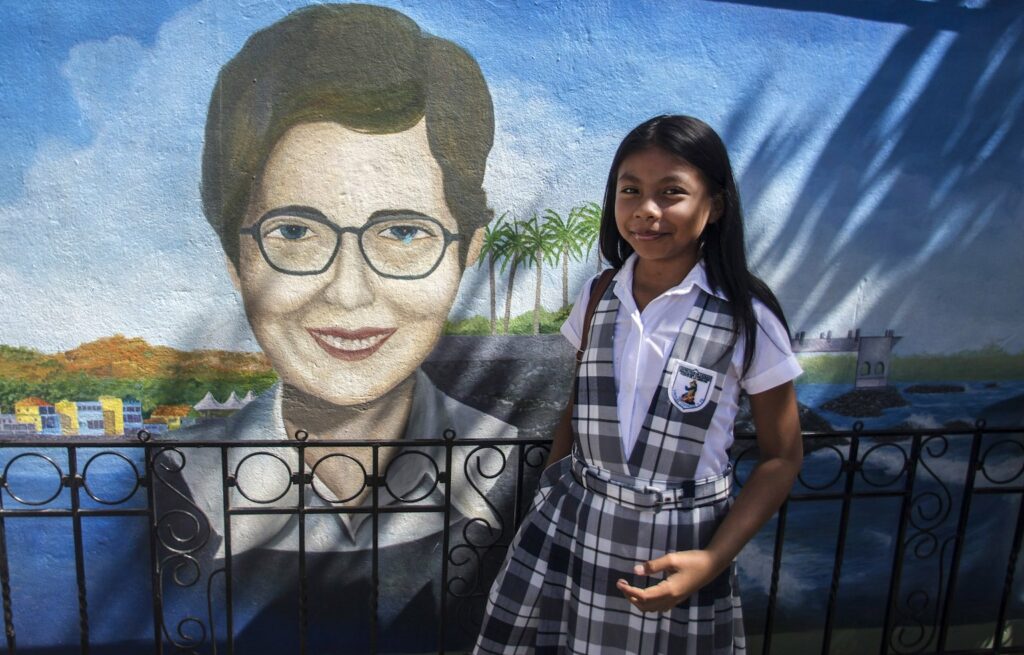CHALATENANGO, El Salvador — Childhood memories for Felipe de Jesus Abrego include celebrating each Dec. 2 with his grandmother at the tomb of two U.S. women religious buried in the local cemetery.
He remembers taking part in the pilgrimages to their tomb and taking part in Stations of the Cross featuring Salvadoran martyrs, where he learned about the lives of the women and others who inspired him.
“We’d read a biography and reflect on the work of the sisters here in Chalatenango,” he said in a Dec. 1 interview Catholic News Service. “Ever since I was little, we were taught to have respect for their work.”
Maryknoll Sisters Maura Clarke and Ita Ford, Ursuline Sister Dorothy Kazel and Jean Donovan, a lay volunteer, served in his native El Salvador and helped his rural population long before he was born, but he has learned much about them through the years. Sisters Ford and Clarke are buried in the cemetery near his house and parish, and on the 40th anniversary of what many increasingly consider their martyrdom, Abrego designed a banner for them.
“Their lives aren’t different than the lives of other Salvadoran martyrs,” he said. “It doesn’t matter where they were from originally, they taught us to stand up and defend the truth.”
In the past, pilgrimages from the sisters’ tombs to Chalatenango’s St. John the Baptist Cathedral were a common occurrence, until increased traffic made the path a dangerous trek, he said.
But he said he remembers years when more than half of Chalatenango, including about 200 young people, would take part in the commemorations.
Abrego said it inspired him to think about the marginalized and to take concrete action to help those around him. Three times a week, he helps prepare meals and serves food for Chalatenango’s homeless population. He also collects and packages food for a small group of commercial sex workers and their families who live in his neighborhood.
Hearing about how the U.S. women left behind a country and lives of relative comfort, he said he learned to serve others.
“It’s important to become aware of the reality of the lives of others, of ways they live,” and try to help, he said.
The U.S. women realized that, and they lived out their lives to serve those whose situations did not resemble theirs, but whom they considered brothers and sisters, he said.
“When you’re young, and you hear about these people who fought and even died for the truth, it leaves an impression,” he said. “When others talk about those who died for their love of their neighbor, for their love of God, it’s a strong way to teach about social justice.”
The women did not just talk but, at risk of losing their lives, they acted: mobilizing food and medicine for injured people and even providing refuge for those who were being persecuted, he said.
To learn about them, “it makes you grow as a person,” he said, and that’s what spurred him to action to see what he could do and who were the most downtrodden around him.
Having such great Christian examples who served in his city and who are buried there, “it makes you be proud of Chalatenango, that they were here and that they stayed here,” Abrego said.
“They are an example of courage, people from another country who gave their lives for us,” he said. “It wasn’t an easy situation back then. They weren’t from here and could have easily gone back to their home country, but they surrendered and renounced everything to work in Chalatenango to serve and work with our people.”
He said they taught those who lived there that service to others is the biggest testament to God.
“I think that’s the most important thing they taught us,” he said.

